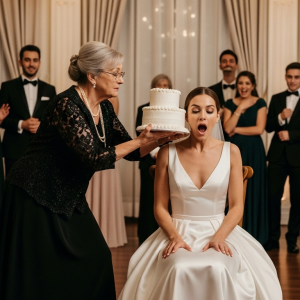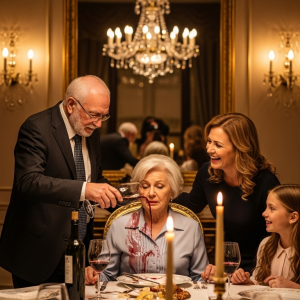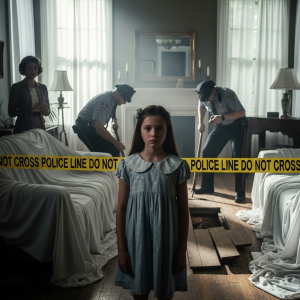The burgundy dress hung in my closet, a ghost of happier times. I’d worn it for Annie’s graduation and her first big promotion. Each time, she’d beamed, telling me how proud she was to have me as her mother.
Now, smoothing the silk over my 62-year-old frame, I wondered if this would be the last time I’d dress up for her. Three weeks of silence had passed since our explosive argument over her wedding. She and her fiancé, Henry, hadn’t asked for a contribution; they had demanded $65,000.
They saw my late husband’s life insurance—the nest egg I guarded for my retirement—as their entitlement. “You’re being selfish, Mom,” she’d said, her voice sharp as winter wind. “Don’t you want me to be happy?”
I tried to explain that happiness didn’t require a destination honeymoon or imported marble bathrooms. I offered $15,000, a generous sum for a beautiful local wedding. But Annie had looked at me with such cold calculation, I barely recognized the girl who once gave me dandelions.
The phone call came on a Tuesday. Annie’s voice was different—softer, almost vulnerable. “Mom, I’ve been thinking. Maybe we’ve both been too stubborn. Could we talk over dinner? I want to work this out.”
My heart lifted despite myself. She was three months pregnant; perhaps impending motherhood had given her perspective. Perhaps she finally understood sacrifice. “I’d like that, sweetheart,” I said, my mind already racing to mend the bridge between us.
“Actually, Henry and I thought we’d take you somewhere nice,” she added. “That Italian place on Meridian Street. Franco’s.”
Franco’s. The place where my Harold had taken me for our 25th anniversary. The lighting was soft, the tables intimate. It was the perfect place to hide the tears I suspected we’d both shed as we found our way back to each other.
Driving to the restaurant, every landmark felt like a page from a book I wasn’t ready to close. The park where I pushed her on the swings, the school where I’d volunteered. Memories of a daughter who felt like a stranger now.
Franco’s was exactly as I remembered, warm and glowing. The hostess led me to a corner table where Annie was already seated, looking radiant in a designer dress that probably cost more than my monthly groceries.
“Mom.” She rose to hug me, and for a moment, breathing in her familiar scent, the unconditional love I’d felt for thirty-four years surged through me. “You look beautiful.”
“You too, sweetheart,” I meant it. “How are you feeling?”
“Better now,” she said, touching her belly with a possessive gesture. “Henry should be here any minute. He got held up.”
Henry Smith. Ambitious, charming, and radiating a confidence that bordered on arrogance. I’d always found him difficult to like, seeing past his expensive suits to a casual dismissal of anyone he deemed beneath him.
“I’m so glad you called,” I said, settling in. “I’ve missed you.”
Something flickered across her face—was it guilt? Before I could decipher it, Henry arrived. But he wasn’t alone. Three men in dark, severe suits carrying briefcases followed him like shadows.
“Mrs. McKini,” Henry said, his smile too bright, too practiced. “Thank you for joining us.” The men took their seats, transforming our intimate dinner into a corporate negotiation. My stomach coiled into a tight, cold knot.
“Annie,” I said, my voice carefully neutral. “Who are these gentlemen?”
“Mom, these are some colleagues of Henry’s,” she replied, her voice steady, but her eyes were fixed on the tablecloth. “They have some paperwork they’d like you to look at.”
One of the men, silver-haired with a predatory smile, leaned forward. “Mrs. McKini, I’m Richard Kirk, Henry’s attorney. We’ve prepared some documents that we believe will be beneficial for everyone.”
The air grew thick. It was the same pressure I’d felt three weeks ago, but this time, it wasn’t anger I felt. It was ice. “What kind of documents?” I asked, though I already knew.
Henry cleared his throat. “It’s quite simple. We’re asking you to sign a power of attorney. Given your age, it just makes sense to have someone younger managing your investments.”
“My age?” I repeated softly. “I’m sixty-two, Henry. Not ninety-two.”
I looked at Annie, begging her with my eyes to intervene, to show some sign this wasn’t her design. But she remained silent, her hands folded primly in her lap.
The attorney pushed a folder across the table. “If you could just sign here and here…”
I opened it. The documents would give them control over everything Harold and I had worked forty years to build. My home, my savings, my future.
“And if I don’t sign?” I asked, my voice miraculously steady.
Annie finally looked up. Her expression was one I had never seen before—chillingly final. “Then you won’t see your grandson grow up,” she said simply. “It’s your choice, Mom. But our lawyer says grandparents’ rights are quite limited, especially when the grandparent has shown a pattern of being… difficult.”
The restaurant faded into white noise. I stared at the woman I’d raised, the stranger sitting in my daughter’s seat. “I see,” I said quietly.
I reached into my purse, my fingers finding my phone. I scrolled to a contact I hoped I’d never have to use.
“Mom?” Annie’s voice held a note of uncertainty. “What are you doing?”
I pressed the call button. “Hello, Michael? It’s Mom. I need you to come to Franco’s on Meridian Street. Now.” I ended the call and placed the phone on the table beside the folder.
“I think,” I said, looking directly at Annie, “that before I sign anything, my son might want to have a few words.”
The confidence around the table fractured. Henry shifted, his practiced smile faltering. The lawyers exchanged uneasy glances. This was not how they expected their prey to behave.
“Mom, there’s no need to involve Michael,” Annie pleaded.
“Isn’t there?” I replied, my hands folded calmly in my lap. “It seems to me that when you bring three lawyers to a reconciliation dinner, you’ve already involved quite a few people.”
Richard Kirk cleared his throat. “Mrs. McKini, perhaps we should discuss this more privately.”
“You mean without my son, who is an emergency room physician and understands pressure tactics better than you can imagine? I don’t think so.” Twenty minutes. That’s how long I had.
Henry tried again, his salesman smile back in place. “We’re not trying to take anything from you. We just want to help you manage your assets more efficiently.”
“And how much would this ‘help’ cost me?”
Henry’s jaw tightened. “This is about family. About making sure Annie and the baby are secure.”
“The baby,” I said, turning to my daughter. “Tell me, Annie. When did you start planning this evening? Before or after you called me about reconciling?”
Her chin lifted, a distorted version of her father’s stubbornness. “Does it matter?”
“It matters to me.”
“Fine!” she snapped, drawing glances from nearby tables. “We’ve been discussing options for weeks. Ever since you made it clear you don’t care about my happiness.”
“Excuse me.” A calm, authoritative voice cut through the tension. Michael stood beside our table, still in his hospital scrubs, his sharp eyes assessing the scene in an instant.
“I’m Dr. McKini,” he said, his gaze landing on Henry. “I believe my mother called for a second opinion.”
Henry stood, extending a hand. “Henry Smith. We were just discussing some financial planning with your mother.”
Michael ignored the lawyers and sat down. “Financial planning? At Franco’s? With a legal team?” He looked at his sister. “Annie, are you feeling alright? Any complications with the pregnancy?”
“I’m fine,” she said, her voice small and uncertain.
Michael picked up the folder, flipping through it. “Power of attorney. Interesting. Mom, did you ask for help with your finances?”
“I did not.”
He closed the folder. “Henry. Gentlemen. Would you mind giving me a moment alone with my mother?” His voice held the unmistakable command of an ER doctor in charge. “I’m not asking.”
After they moved to the bar, Michael leaned in. “Mom, talk to me. What’s happening?”
Tears of relief threatened to fall. “They want me to sign everything over. Annie said if I don’t, I won’t see my grandchild.”
Michael’s jaw tightened, just like Harold’s when he witnessed a true injustice. “That sounds like financial coercion, not family planning. Are you having any memory issues? Anything at all?”
I almost laughed. “Michael, last month I renegotiated my car insurance and caught an error on my property tax assessment. Does that sound like someone who needs a guardian?”
“No,” he said, his voice cold with fury. “It sounds like the woman who taught me the value of a dollar.” He glanced toward Annie. “What happened to her, Mom?”
It was the question I’d been asking myself for months. “I don’t know. Or maybe… maybe Henry happened to her.”
Before I could answer, Henry strode back, his legal pack trailing behind him. “I’m sorry to interrupt, but we do have a timeline. The wedding is in three months.”
“Of course,” I said, standing slowly. “A timeline.” I picked up my purse, the calm settling over me now absolute. “I’ve made my decision.”
The relief on Henry’s face was immediate. Even Annie relaxed slightly.
“I’ll sign,” I said.
But as the lawyer pushed the pen toward me, I held up a hand. “First,” I continued, reaching for my phone again, “there’s one more person who should be here.”
I dialed a number I’d added two weeks ago, when a mother’s intuition had warned me this dinner might be a trap. “Louise? It’s Anne McKini. Could you come to Franco’s? Yes, please bring the documents we discussed.”
Henry’s face shifted from relief to confusion to alarm. “Who is Louise?”
I set the phone down. “Louise Qualls,” I said pleasantly. “My attorney.”
The silence that followed was heavy and dangerous. Richard Kirk’s predatory smile vanished.
“Your attorney?” Henry repeated. “When did you hire an attorney?”
“The same day your associate started asking my neighbors if I’d been acting strangely,” I replied, watching his composure crumble. “Did you really think Mrs. Anderson wouldn’t mention it? Or that the mailman wouldn’t tell me you’d been asking if my bills were paid on time?”
Annie’s face went pale. “Mom, we never…”
“Never what, sweetheart?” I opened my purse and pulled out a small envelope, spreading its contents on the table. Photographs of my house. Printed emails between Henry and a private investigator. Inquiries about my financial records. “I believe this is called building a case for incompetence.”
Louise arrived twelve minutes later, a silver-haired woman with the energy of a hawk. “Gentlemen,” she said, surveying the table. “I believe you have some documents for my client.”
Richard Kirk cleared his throat. “This is a family matter, Ms. Qualls.”
“You’re right,” Louise said, opening her own briefcase. “Which is why I’m here to protect my client from financial exploitation disguised as family concern. Before we discuss your documents, I think you should see what Mrs. McKini has already put in place.”
She spread a new set of papers on the table. Official, stamped, and sealed. I watched Henry’s face drain of all color as he read them.
“An irrevocable trust,” Louise explained conversationally. “Established two weeks ago. All of Mrs. McKini’s assets—her house, her investments, her savings—have been transferred into it.”
“The beneficiaries,” I finished, my voice clear and strong, “are my grandchildren, born and unborn. Michael is the trustee.”
The implications hit Henry like a physical blow. “But… what about the wedding?” he demanded.
“What about it?” Louise asked. “The trust provides for education and medical care. I don’t see a line item for imported marble.”
“This is ridiculous!” Henry seethed, turning to Annie. “Tell them!”
Michael looked at his sister. “Did you have an agreement, Annie? Or did you have demands backed by threats?”
Annie looked from Henry’s furious face to Michael’s disappointed one, and finally, to me. Her eyes filled with tears. “I’m pregnant,” she whispered, as if that explained everything. “We need security.”
“Your child will be provided for,” I said gently. “But Henry will never have access to a penny of it. I’m not cutting you out, Annie. I’m protecting your inheritance from him.”
Louise smiled. “Mr. Smith, my client has documented a systematic campaign of harassment and attempted financial coercion. I suggest you and your colleagues leave before we discuss this further with the state bar association.”
The lawyers gathered their things and fled.
As we walked out into the cool night air, I left Annie crying at the table with Henry. “Annie,” I had said softly, “when you are ready to have a real conversation, without lawyers and without demands, you call me. But you call me alone.”
To Henry, I had only one thing to say. “Stay away from my family.”
Standing on the sidewalk, Louise asked, “How do you feel?”
I thought for a moment, the weight of the past months lifting from my shoulders. “Free,” I said finally. “For the first time in a long time, I feel free.”
Six months later, my life had a new purpose. I’d started a volunteer group at the community center, a support network for seniors who had faced situations like mine. We called ourselves “The Unmovables.”
Henry, I’d heard, was under investigation for professional misconduct. Annie had postponed the wedding indefinitely and was living in a small apartment.
One evening, Michael called. “Mom,” he said gently. “Annie had the baby. A girl.”
The news was a punch to the gut, a mix of joy and sorrow.
“They named her Eleanor,” he added. My mother’s name. A calculated, manipulative choice. “Annie wants you to visit.”
I spent that night thinking, not about what was expected of me, but about what I needed to protect myself. The next day, I wrote a letter.
Annie,
I would very much like to meet Eleanor. However, any contact between us must respect the boundaries I have established.
I am willing to visit with Eleanor in Michael’s presence. Any attempt to discuss my finances or past grievances will end the visit immediately.
If you can accept these terms, have Michael arrange a meeting. If not, I hope you will reconsider when you are ready to prioritize your daughter’s grandmother over my money.
I will always love the daughter you were. I am no longer available to be harmed by the person you’ve chosen to become.
With hope for your growth, and boundaries for my protection,
Mom.
I sealed the envelope and walked to the mailbox. The burgundy dress still hung in my closet, but it was just a dress now. The woman who walked into Franco’s was a victim. The woman who walked out was something far more powerful. She was a grandmother who had learned that the greatest gift she could give her family was the example of a woman who could not be moved.




